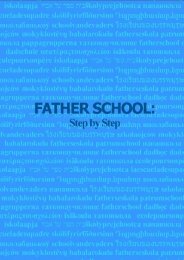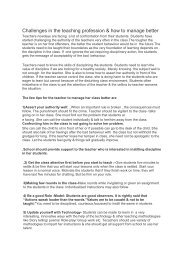I want to share with you one incident that has made me very unhappy and about whichI want your opinion. As you know, my daughter Hameeda, who is just six, goes to schoolnow. The other day there was an art competition at her school. Perhaps, mothers wereexpected to train their children at home. I didn’t, but on the morning <strong>of</strong> the competition Isent her to school with some paper and crayon. Hameeda left home looking very gay andhappy. She returned home in tears, quite broken-hearted and sobbed inconsolably. Shewas bitterly disappointed that she had received no prize unlike some <strong>of</strong> her friends. Shecould not understand why this had happened as they had all done the same thing —drawn pictures on paper! After I had pacified her and bought her a little gift and reassuredher that her painting was beautiful she seemed a bit soothed. It hurt me to see a little child<strong>of</strong> six, so pained for no fault <strong>of</strong> hers. As I tucked her into bed at night my little Hameedaasked “Ma, today I did less well, didn’t I? Dhruv did better than me, isn’t that so?” Sucha question from a six-year-old did come as a shock!The whole incident left me furious and puzzled. I was naturally very distressed at mydaughter’s unhappiness and I was worried about her loss <strong>of</strong> self-confidence. I feared thatfeelings <strong>of</strong> inferiority and failure might forever be instilled into her little mind even fromthis tender age. On the following day, I gently told her teacher that they could havespared the children all this pain and frustration if they had only skipped the competitionand allowed the children to draw or paint, which is such a beautiful thing to do. Theanswer was: “But surely the good ones should receive some encouragement”.Tell me, Uma how important and integral to learning is competition? Must we applaudexcellence and punish mediocrity to make children learn? All this grading and rankingand prize-giving that we have in our schools, are they necessary? Can’t children learneasily, happily without comparing themselves with others and competing hard againsteveryone else, as if, somehow, their success depended upon some else’s failure? Mustlearning be so cruel? Do write to me soon.Yours affectionately,(Zubeida.)Many <strong>of</strong> us have had such experiences, haven’t we, <strong>of</strong> feeling highly elated andthrilled on being praised and rewarded and also <strong>of</strong> sinking into dejection at notsucceeding or at being ranked low?Some people feel that organising various competitions and spurring children on to dobetter each time, competing with everyone else is a good thing, for it makes childrentough and when they grow up they can compete with the same spirit and make it to thetop as the most successful people in the world. Others feel equally strongly thatencouraging competition at school by giving marks, grades, ranks and by organisingvarious competitive situations destroys something beautiful in the child. Comparing onechild’s ability with another’s and constantly motivating one to beat the other, is beingviolent to the inner being <strong>of</strong> the child by sowing seeds <strong>of</strong> jealousy and hurt. Would it notbe right that instead <strong>of</strong> training pupils to be tough and competitive when they grow up,we helped them to become so intelligent that they would refuse to compete and bringmare discord into the world? Because the best in them has been nurtured they wouldflower and help others do so. Therefore, should we not let them learn at school with a
sense <strong>of</strong> freedom and without the pressures <strong>of</strong> comparison and competition? That is whyZubeida asks that question in her letter to Uma:“Must we applaud excellence and punish mediocrity to make children learn?” Itprompted Uma to hold a spirited discussion in class that day and most <strong>of</strong> the childrenconfessed that comparison did hurt them and was not necessary or desirable.Wilt you also give this question serious thought? Discuss it in class or with yourfriends.Do you remember any situation when you specially needed reassurance and kindlyappreciation?Do you think competition results in discouragement and fault-finding?10. On RelationshipThere was a general grumbling session on and they were talking about their teachers— some nine or ten students sitting by a lovely lotus pond. None <strong>of</strong> them watched thegoldfish in the waters, for their eyes and ears and minds were on the conversation. Theywere discussing their teachers. Their feeling was that a teacher who develops a prejudiceagainst a student never drops it. However hard you tried, it was always the same story;the same distant look, the same harshness in the voice, the same remark in the notebook.They may talk <strong>of</strong> not having fixed opinions, but the students’ experience was different. Ifthey liked you, you could do no wrong; otherwise you were always in the wrong.“Teachers are very partial,” they argued.One <strong>of</strong> the girls said, “I don’t like them generally, because most <strong>of</strong> them are sonarrow-minded, conservative”, using haltingly the latest word she had learnt in class.“Look! What is the point <strong>of</strong> having a co-educational school, if girls can’t talk to boys orboys can’t talk to girls? We have to sit separately, eat separately, and read separately. Theother day, Saleem and I were together looking at the Encyclopaedia in the library to findout all about dolphins and there was Miss X giving me a nasty look. I wished I couldhave gone under the sea myself.”They conceded that there were exceptions and some <strong>of</strong> the teachers were wonderfulpeople but in a large school like theirs, the verdict was that most teachers cannot beloved. Teachers are to be feared and obeyed.In another corner <strong>of</strong> the school, correcting notebooks <strong>of</strong> various classes was a group <strong>of</strong>teachers discussing students. They felt that students were no longer eager to learn, nolonger hard working and innocent as in their days. “They are a bunch <strong>of</strong> lazy, good-fornothingkids,” they grumbled. Gone are the days when you saw their eyes shine in classwith understanding, when hands would be raised before they answered, when all theirwork was neat and tidy; (something has gone wrong today. There may be exceptions but,on the whole, (students are not interested in their studies. They are too distracted. Perhapsit is because <strong>of</strong> the cinema or the radio or the television. Their minds have becomerestless. They are pleasure-seeking. They are bored with everything except those thingsthat arouse their sensations. “Their parents are to blame,” they said,’’ Do you thinkparents have any time for children these days?’’ they argued.
- Page 1 and 2: THINKING TOGETHERAhalya ChariNATION
- Page 3 and 4: There is, therefore, a different ap
- Page 5 and 6: 20. On Beauty21. When Trees Hold a
- Page 7 and 8: dustbin, lifting a child that had f
- Page 9 and 10: thoughtless and conceited and she w
- Page 11 and 12: his hair combed back neatly. Anita
- Page 13 and 14: that require the use of the hands.
- Page 15 and 16: slightly bigger decision like ‘Sh
- Page 20 and 21: Yet another teacher said, “I don
- Page 22 and 23: them but can one have fun even whil
- Page 24 and 25: studies and they were angry that th
- Page 26 and 27: The entire evening and all the item
- Page 28 and 29: know best what your hurts are at th
- Page 30 and 31: working with your hands there is no
- Page 32 and 33: job. In fact, since his school days
- Page 34 and 35: Bachhu lived in the hills of the no
- Page 36 and 37: important for growing children. His
- Page 38 and 39: through design books and his eyes n
- Page 40 and 41: tamarind, cotton, kadam, cinnamon,
- Page 42 and 43: vision of education. Children loved
- Page 44 and 45: from which he draws his energy. In
- Page 46 and 47: “What about you, Lalitha? Aren’
- Page 48 and 49: you hear the whine of a dog hit by
- Page 50 and 51: stuffed with the opinions and belie
- Page 52 and 53: to make the work simpler. There wer
- Page 54 and 55: Devinder’s can he such happy, pro
- Page 56 and 57: means that if you are an Englishman
- Page 58 and 59: TEACHER: No, he can’t. He is resp
- Page 60 and 61: serene face. He also learnt at scho
- Page 62: not calculate and solve elaborate m
















